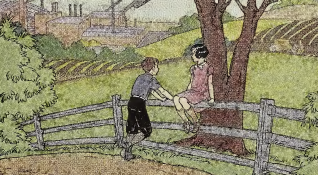HUNDREDS OF PEOPLE WORK FOR YOU
成百上千的人為你工作
Did you ever stop to think that there are hundreds of people working for you every day?
你有沒有想過每天都有成百上千的人為你工作?
Perhaps you don't see how that can be true.
也許你在想這不是真的。
Let us think a moment.
讓我們想一下。
That orange or apple or grapefruit you ate for breakfast—did it just drop from the tree on to your table?
你早餐吃的橘子、蘋果或葡萄柚——是從樹上掉下來的嗎?
The wool in the clothes you are wearing—did you take it from the sheep and put it on?
你衣服上的羊毛,是你從羊身上取下來穿上的嗎?
No. The fruit you eat comes to you because men and women have planted trees, picked the ripe fruit, and in other ways helped you to have it.
不是。因為農夫們種了樹,摘下成熟的果實,然后通過其他方式,這才讓你吃上水果。
Your clothes are the work of sheep-herders, sheep-shearers, cotton-pickers, cloth-makers, railroad men, and others.
你穿的衣服是牧羊人、剪羊毛人、揀棉人、織布人、鐵路工人和別人的成果。

Now do you see that there are really many, many people working for you?
現在你看到有很多很多人為你工作了吧?
Yes, the world is full of workers.
是的,工人們無處不在。
They are working that you and I may have food to eat, clothes to wear, homes to live in, and other things to make us happy and comfortable.
他們工作,好讓我們有食物吃,有衣服穿,有房子住,讓我們的生活快樂舒適。
In this part of your book, you will read stories that tell how some of the world's work is done.
本部分,我們將為您講述世界上的一些工作是如何完成的。
First, you will be carried back to the time when our country was young,
首先,你們將會被帶到國家年輕的時候,
and you will see the busiest man of those days making something that meant greater comfort to thousands.
你會看到那個時代最忙的人,他們從事著一些讓成千上萬人更舒服的職業。
Then you will visit groves of golden oranges, watch sheep losing their warm coats of wool,
然后你會去參觀一叢叢金橘林,看到羊毛是如何剪的,
see some boys working faithfully so that they may have a playground,
看到一些男孩盡職地工作,所以他們可能有一塊空地,
and last of all, sail out to capture some blackfish.
最后,出海去抓一些黑魚。











